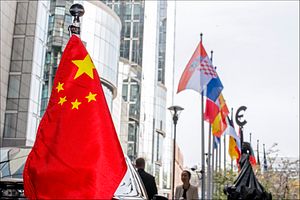During the 19th EU-China annual summit, held in Brussels on June 1-2, the two partners came to a number of agreements, signalizing a new era of cooperation. In the framework of economic solidarity, a common Memorandum of Understanding was signed, aiming at a joint investment strategy to benefit small- and medium-sized EU businesses. This policy was adopted, however, during a period when investment relations between China and the EU are being tested.
China is the EU’s second-largest trading partner and offered the economic boost that the EU needed during the 2009 economic crisis. For their part, since 2001 Chinese investors have been turning to the EU in order to take advantage of the opportunities that a free market with high-tech firms and large-scale products and consumers provides. Through greenfield investments, mergers, and acquisitions, Chinese investors managed to consolidate their economic power in the EU.
More recently, the expansion of the Chinese investors in the EU has been integrated into a regulated central government strategy of “going out.” The Chinese government also unveiled the ”One Belt, One Road” initiative, which aspires to create a maritime and land route connecting Asia with Europe. OBOR offers new perspectives to potential investors. As examples in Europe, the Chinese enterprise COSCO acquired a 67 percent stake in the Greek port Piraeus, while China agreed with Serbia and Hungary to build a high-speed rail line that will connect Piraeus port with Europe’s inland.
At first, EU members welcomed the capital inflow of Chinese investors and the potential opportunities for cooperation. According to Rhodium Group, in 2016 Chinese companies invested 35 billion euros ($41 billion) in the EU, a 77 percent increase from 2015. However, the Chinese investment pattern has changed slowly but steadily over the years, causing concerns in EU member states. In the early years, Chinese investors took advantage of the benefits the less-developed southern European economies could provide and invested in a wide range of sectors, from real estate to entertainment. Now, their investment policy has become more strategically planned, aiming at long-term national benefits. Chinese investors are redirecting their efforts to the three major European economies — Germany, the U.K., and France – and targeting manufacturing enterprises and high-tech firms.
Increased Chinese acquisitions of technologically significant European enterprises especially the acquisition of German robot manufacturer Kuka by Midea Group, caused a sudden conversion about Chinese investments. The vice chancellor and federal minister for economic affairs and energy in Germany, Sigmar Gabriel criticized Chinese investment policy in a biting article. Chinese expansion into sensitive EU sectors, as well as the technology transfers involved, may prove destructive for the EU’s economy, some European officials warn. This fear may be proven realistic, as European firms in China predict that domestic firms will close the innovation gap by 2020. The suspicion among EU representatives is being escalated also by the lack of reciprocal access for European investors. EU investors have to tackle numerous political and legal obstacles in China that affect the success of their ventures.
The protectionist trend in the EU has now reached unprecedented levels. In February 2017 Germany, France, and Italy joined together to request the European Commission be given more authority to scrutinize and potentially block Chinese investments in sensitive sectors at the national level. European Council Regulation (EC) No 139/2004 provides to the Commission the authority to scrutinize the concentrations resulting from a merger at the EU-wide level, based on the turnover thresholds of the companies. At the national level, however, only some member states have legislation granting the government the power to review foreign investments in case of a public or national security threat. Some European members have strongly protested against the limited authority they have to inhibit Chinese expansion and protect their national enterprises from state-funded Chinese investments.
However, there is not a common European approach toward Chinese investors. Some European members — among them, Greece, Hungary and Portugal –have developed tighter trade bonds with China, seeking an economic boost. Hence, the adοption of a common stricter policy against Chinese takeovers and the introduction of protection mechanisms is far from an achievable target. The protectionist moves have also not been welcomed by many in the business community. “For many German companies, China is now the single most important market,” Thomas Heck, head of the China business group at PwC in Germany, declared. The Commission tried to appease the crisis by stating that it is aware of the dangers the European enterprises face, but any investigation into questions of competition is based on the law and the EU Treaties and not external factors and national assessments.
Whatever policy the EU eventually adopts, it will make clear if Chinese investors are viewed as a threat or an opportunity. The EU has to be cautious and avoid closing the door on a significant partner, following the protectionist tendencies in the United States. China has also pledged to work with partners to address some fo these concerns. “China is willing to cultivate a fair investment policy for the foreign investors,” Foreign Ministry spokesperson Hua Chunying has declared. China is corresponding gradually to the EU’s demands for more transparent and compatible legislation that promotes European enterprises.
The adoption of a bilateral investment treaty will establish the premises for conducting investments on equal footing and will alleviate existing imbalances. Now is the time for the EU and China to recommence these negotiations, before new political οbstacles hamper their investment relationship.
Magda Tsakalidou is a law graduate from Aristotle University of Thessaloniki and a EU-China relations researcher, focusing on investment law.

































